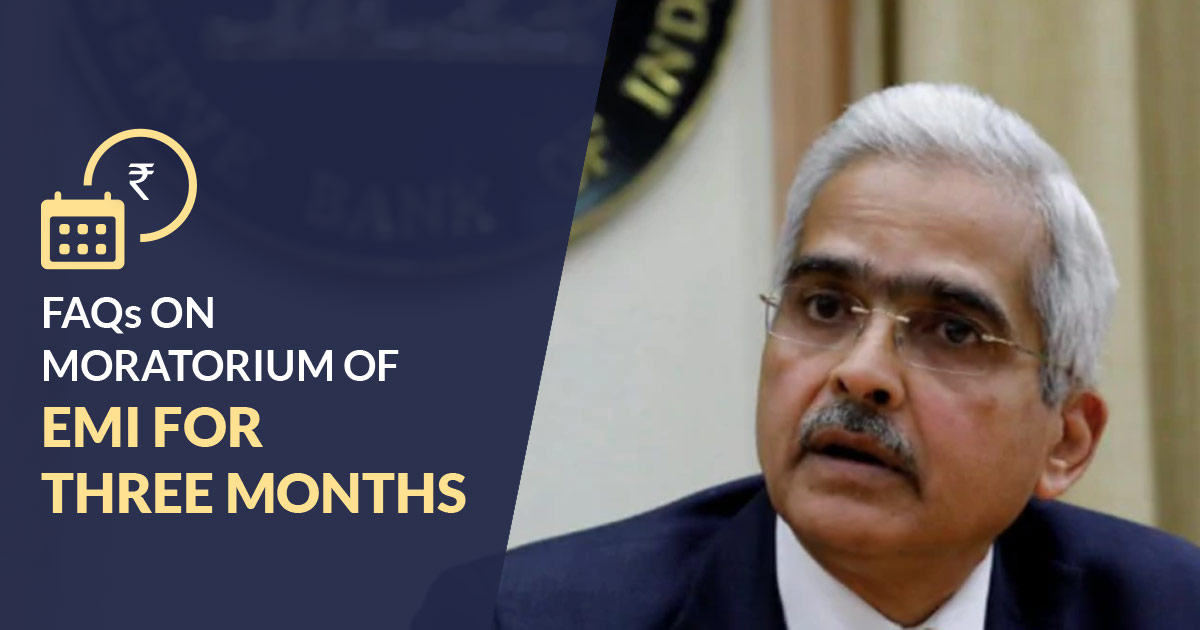
The Reserve Bank of India has issued directions in the form of frequently asked questions (FAQs) for the treatment of EMIs on term loans from 1st March 2020. The provisions will be applicable for a period of three months. The decisions were taken keeping in mind the problems faced by loan bearers because of the outbreak of COVID-19.
The Frequently Asked Questions Answered are as Follows:
#1. What is the purpose of RBI’s announcement regarding the relief package?
The Reserve Bank of India has issued the relief package because of the problems faced by the lona beares due to the outbreak of coronavirus or COVID-19. RBI realised that there is a shortage of liquidity in the market and the businesses are also earning low profits, so to help such people in continuing the business RBI has issued the package.
#2. What are the facilities provided?
All types of term loans have been provided the facility of postponing the payment of monthly installments for a period of three months for the period of 1st March 2020 to 31st May 2020. The maturity date of the loans will also be rescheduled. For example if the maturity date of a loan is 1st June 2030, then the maturity date of the loan after the relief package will be 1st September.
#3. Is the package available for all?
Yes, the benefits of the package issued by RBI can be availed by all kinds of borrowers on all kinds of term loans without any exceptions. All kinds of borrowers are included under the scheme to reduce the paperwork and to maintain smoothness in the daily works of the banks.
#4. Is the scheme applicable on principal amount or interest or both?
Yes, the scheme of rescheduling is applicable to the whole EMIs (principal and interest both), however, the term loans under which repayment process has not been started, the borrower will be required to pay the interest amounts only without any principal.
#5. Is the scheme applicable to if the extension goes beyond the maximum period stipulated for a product or as stipulated in the loan scheme?
Yes, extension in such cases can be availed without any special applications or permissions.
Read Also : Financial Reporting Guidelines by ICAI Amid Coronavirus
#6. How will the loans for working capital be treated under the scheme?
In the case of working capital or deferred payments, the EMIs will be collected from 30th June, 2020 as such payments are collected at the time of month end under regular cases.
#7. What will be the consequences for the delay of the payments?
Generally, any delays in the payments are recorded by Credit Bureaus but any delays in payments falling between 1st March 2020 and 31st May 2020 will not be penalised or fined in any way. Securities and Exchange Board of India (SEBI) has also said that Credit Rating Agencies (CRAs) should not consider a default as default if it was made during the lockdown period.
#8. Is it mandatory to accept the scheme?
It is not mandatory for an individual to avail the benefit of the scheme if he/she is earning sufficient profits as the amount of EMIs for the period will sum up after three months that may create a burden for such individuals.
#9. Is the scheme applicable for credit card bills?
Yes, the scheme is applicable on credit card payments too, but it is possible that an interest is charged by the bank for the non-payments. No penalties will be charged for delayed payments during the period.
#10. What to do if a bank representative asks for the repayment?
If a bank representative asks for a payment of EMI, you can easily tell him no, that you will be availing the benefits of the RBI’s scheme.
#11. Is the policy applicable to the cases of interchangeability for fund based to non fund based and non fund based to fund based?
Yes, the scheme will be applicable to interchangeability cases. Arising during the period.
#12. What are the types of other reliefs given to the businesses?
The businesses are allowed to get their working capital requirements re-assessed during the shortage of funds. They can ask for relief in securities or non fund based facilities. The baks will decide on approval of such cases accordingly.
#13. Is the scheme of ease of working capital applicable to NFBs/MFIs/HFCs?
Such cases are not included by RBI under the scheme but RBI has issued some provisions for liquidity for such borrowers under Targeted Longer-term Refinancing Operations i.e. TLTRO. Banks are allowed to meet 50% of incremental holdings from the primary market and remaining from the secondary market and help these intermediaries.
#14. Are these methods of RBI considered ‘restructuring’? What will be the provisions applicable under this?
All the schemes issued by RBI to counter the impact on liquidity by COVID-19 will not be considered as ‘restructuring’ and hence, the provisions of Restructuring will not be applicable.
#15. How will the EMIs under SI/ECS/NACH be demanded and recovered?
To get the information about such cases, the individual is suggested to contact his/her bank.






